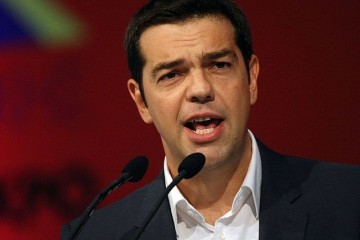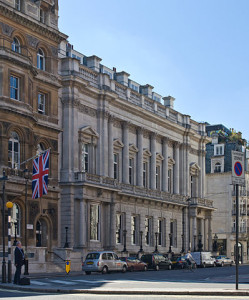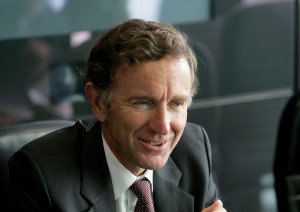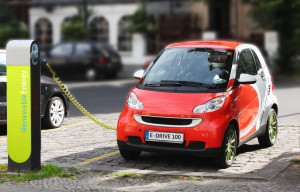By Alex Plough February 20, 2015

Alexis Tsipras, Syriza, source: FrangiscoDer – Eigenes Werk. Lizenziert unter CC BY-SA 3.0 über Wikimedia Commons.
Grexit Menace
The European dream of a continent united by a single currency is facing its biggest test this week after tense negotiations between the new Greek government and its Eurozone creditors broke down on Monday.
Europe’s finance ministers want Greece to renew the country’s bailout package, which is set expire by the end of the month, but Greek Prime Minister Alexis Tsipras has rejected the deal’s tough austerity conditions.
Instead, Athens offered a last minute compromise on Thursday, requesting a six-month extension to the bailout program to save the country from bankruptcy while talks continued. Hostile German finance ministers stood firm and quickly rejected the offer, piling even more pressure on Greece to accept the original bailout terms or face running out of cash in a matter of weeks.
This widening gulf between the Greek coalition government, led by the anti-austerity Syriza party, and European finance ministers threatens to push Greece out of the European bloc, an event which could lead to the break up of the single currency union itself.
Analysts at Barclay Bank are warning clients that the risk of a Eurozone breakup is “significantly higher than at any point in 2012.” Meanwhile the bookmaker Paddy Power recently slashed its odd on a Greek exit by the end of 2016. Open Europe, a London-based think thank, outlined what it sees as Greece’s demands and the chances they will be met.

“HSBC Private Bank, London – June 2009” by Diliff – Own work. Licensed under CC BY-SA 3.0 via Wikimedia Commons.
HSBC Scandal Widens
Last week’s revelations that the Swiss branch of HSBC’s private bank helped wealthy clients evade taxes has turned into a widening scandal for the UK bank, after Swiss prosecutors raided its Geneva headquarters on Wednesday.
Swiss authorities said the move was part of an investigation into “aggravated money-laundering” and was prompted by the recent investigation by the International Committee of Investigative Journalists (ICIJ). The journalists used leaked bank records to claim that the HSBC sheltered funds for “dictators and arms dealers,” as well as wealthy tax-dodgers.
If prosecutors find evidence that the bank ignored anti-money laundering rules after December 2012, then the consequences would be felt far beyond its Swiss outpost. That date marks the signing of a deferred prosecution agreement with the US authorities to settle charges that it laundered profits of Mexican drug trafficking gangs and helped Iran evade sanctions. HSBC could lose its US banking licenses if it was found to have broken the terms of its agreement, a devastating blow that would effectively cut off direct access to the U.S. bank market.

Lord Stephen Green, September 2006 by World Economic Forum on Flickr (www.weforum.org). Licensed under CC BY-SA 2.0 via Wikimedia Commons
The former boss of HSBC who was in charge during the time of the alleged crimes, Lord Stephen Green, has come under intense criticism for his failure to rein in the Swiss branch. Last weekend he announced he would be stepping down from his role as head of an influential financial services lobby group.
UK newspaper The Telegraph has come under scrutiny for its failure to hold HSBC to account. On Tuesday its chief political commentator, Peter Oborne, publicly resigned while alleging the newspaper deliberately ignored the growing scandal to protect its relationship with HSBC, a major advertiser for the paper.

“A123 Systems Advanced Research, Ann Arbor, Michigan” by Dwight Burdette – Own work. Licensed under CC BY 3.0 via Wikimedia Commons.
Apple’s Electric…Minivan?
Rumors that US tech giant Apple is developing its own electric vehicle were given greater credence by news this week that electric-car-battery maker A123 Systems is suing the company for poaching its engineers to build a large-scale battery division.
The Wall Street Journal first broke the news that Apple had hundreds of employees working on a secret electric vehicle project, apparently code-named “Titan,” to build what insiders described as a minivan. While the Cupertino, California-based company has so far denied the rumors, analysts have been praising the move as a potential $50 billion opportunity in the US alone.

“Electric Car Recharging” by Michael Movchinderivative work Licensed under CC BY-SA 3.0 via Wikimedia Commons.
Bloomberg assembled a list of reasons why an Apple-branded car makes sense. It’s $178 billion cash pile mean the device maker has money to burn and the car is one of the few places where its products are not yet seamlessly integrated into people’s lives.
Washington Post blogger Hayley Tsukayama is more skeptical about the possibility, comparing it to earlier rumors that Apple would develop its own smart TV, which never panned out. Says Tsukayama: “Given Apple’s reputation for cool— even of the practical, luxury-to-the-masses variety—one has to ask: A minivan? Really?”
If it is a serious project, Apple’s longtime design guru Jonathan Ive will surely aim to make the iCar is as desirable as his other products. In a recent interview with The New Yorker, Ive poured scorn on the “insipid” designs of such modern cars as the Toyota Echo. (In related news, we recently wrote about Tesla’s grand ambitions for it’s own electric cars, Apple’s giant solar power deal and Google’s new ride-sharing project.)

Oscars statuettes © Prayitno/ Flickr
Oscar Math
With Oscar weekend coming up, journalists across the country have come up with increasingly innovative ways to slice and dice the wealth of movie data now available. An interactive by Quartz uses data on past Oscar winners from movie review site Rotten Tomatoes to compare film ratings from critics and everyday viewers. Meanwhile, Bloomberg crunched the numbers on past award-winners to work out a formula for Oscar success.
****
Alex Plough is a freelance business journalist based in New York. Originally from London, England, he has a background in data-driven investigative reporting and has worked on a number of agenda-setting projects such as the award winning Iraq War Logs for the Bureau of Investigative Journalism. More recently he graduated from Columbia Journalism School’s masters program, business and economics reporting concentration, as well as Columbia’s Lede Program – a three month course designed to apply the tools of computer science to journalism. He is particularly interested in the overlapping fields of finance, technology and how young people are shaping the new American economy.
This entry was posted on Friday, February 20th, 2015 at 5:01 am. It is filed under Week in Review and tagged with Alexis Tsipras, Apple Inc., electric cars, Eurozone, Grexit, HSBC, money laundering, Oscars, Swiss banking. You can follow any responses to this entry through the RSS 2.0 feed.
Comments are closed.
